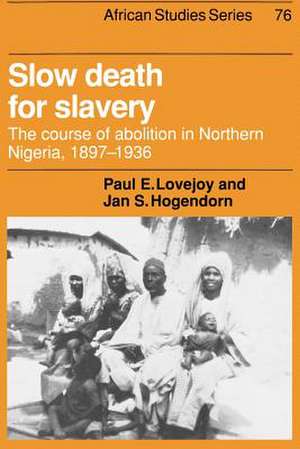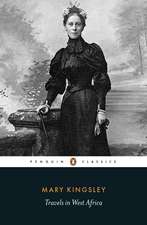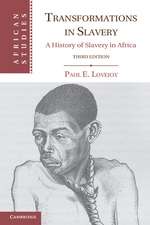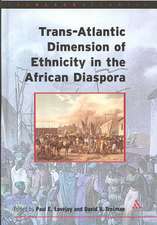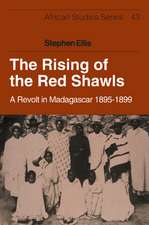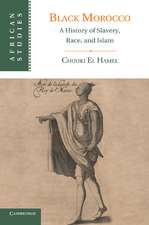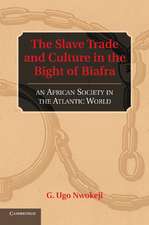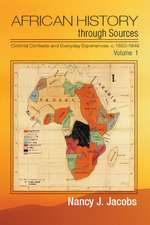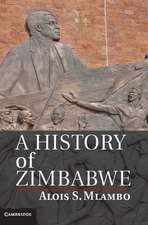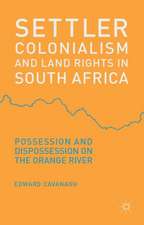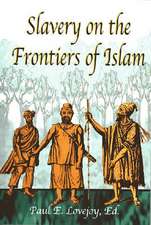Slow Death for Slavery: The Course of Abolition in Northern Nigeria 1897–1936: African Studies, cartea 76
Autor Paul E. Lovejoy, Jan S. Hogendornen Limba Engleză Paperback – 30 iun 1993
Din seria African Studies
-
 Preț: 177.35 lei
Preț: 177.35 lei - 9%
 Preț: 731.13 lei
Preț: 731.13 lei -
 Preț: 275.85 lei
Preț: 275.85 lei -
 Preț: 178.45 lei
Preț: 178.45 lei -
 Preț: 231.24 lei
Preț: 231.24 lei -
 Preț: 204.11 lei
Preț: 204.11 lei -
 Preț: 202.11 lei
Preț: 202.11 lei -
 Preț: 223.29 lei
Preț: 223.29 lei -
 Preț: 310.62 lei
Preț: 310.62 lei -
 Preț: 342.31 lei
Preț: 342.31 lei - 11%
 Preț: 696.80 lei
Preț: 696.80 lei -
 Preț: 184.93 lei
Preț: 184.93 lei -
 Preț: 238.11 lei
Preț: 238.11 lei -
 Preț: 177.35 lei
Preț: 177.35 lei -
 Preț: 208.25 lei
Preț: 208.25 lei -
 Preț: 299.45 lei
Preț: 299.45 lei - 23%
 Preț: 326.14 lei
Preț: 326.14 lei - 15%
 Preț: 459.92 lei
Preț: 459.92 lei - 15%
 Preț: 295.49 lei
Preț: 295.49 lei - 13%
 Preț: 296.11 lei
Preț: 296.11 lei - 18%
 Preț: 1007.12 lei
Preț: 1007.12 lei - 18%
 Preț: 1050.78 lei
Preț: 1050.78 lei -
 Preț: 446.37 lei
Preț: 446.37 lei - 12%
 Preț: 301.75 lei
Preț: 301.75 lei - 25%
 Preț: 770.26 lei
Preț: 770.26 lei -
 Preț: 110.05 lei
Preț: 110.05 lei - 18%
 Preț: 1106.02 lei
Preț: 1106.02 lei -
 Preț: 480.24 lei
Preț: 480.24 lei - 18%
 Preț: 1003.30 lei
Preț: 1003.30 lei - 18%
 Preț: 182.41 lei
Preț: 182.41 lei -
 Preț: 489.10 lei
Preț: 489.10 lei -
 Preț: 477.72 lei
Preț: 477.72 lei - 25%
 Preț: 853.03 lei
Preț: 853.03 lei - 18%
 Preț: 179.93 lei
Preț: 179.93 lei - 26%
 Preț: 762.16 lei
Preț: 762.16 lei - 18%
 Preț: 710.05 lei
Preț: 710.05 lei -
 Preț: 321.93 lei
Preț: 321.93 lei -
 Preț: 486.80 lei
Preț: 486.80 lei -
 Preț: 273.50 lei
Preț: 273.50 lei - 13%
 Preț: 311.00 lei
Preț: 311.00 lei - 18%
 Preț: 995.09 lei
Preț: 995.09 lei - 18%
 Preț: 703.45 lei
Preț: 703.45 lei -
 Preț: 322.12 lei
Preț: 322.12 lei -
 Preț: 287.48 lei
Preț: 287.48 lei -
 Preț: 286.69 lei
Preț: 286.69 lei
Preț: 275.63 lei
Nou
Puncte Express: 413
Preț estimativ în valută:
52.74€ • 55.21$ • 43.64£
52.74€ • 55.21$ • 43.64£
Carte tipărită la comandă
Livrare economică 05-19 aprilie
Preluare comenzi: 021 569.72.76
Specificații
ISBN-13: 9780521447027
ISBN-10: 052144702X
Pagini: 412
Ilustrații: 1
Dimensiuni: 152 x 229 x 23 mm
Greutate: 0.59 kg
Editura: Cambridge University Press
Colecția Cambridge University Press
Seria African Studies
Locul publicării:New York, United States
ISBN-10: 052144702X
Pagini: 412
Ilustrații: 1
Dimensiuni: 152 x 229 x 23 mm
Greutate: 0.59 kg
Editura: Cambridge University Press
Colecția Cambridge University Press
Seria African Studies
Locul publicării:New York, United States
Cuprins
List of maps; List of tables; Preface; 1. Slavery and the British conquest of Northern Nigeria; 2. Fugitive slaves and the crisis in slavery policy; 3. The debate on legal-status abolition; 4. Emancipation and the law; 5. Upholding proprietary rights to land; 6. The role of taxation in the reform of slavery; 7. The colonial economy and the slaves; 8. The persistence of concubinage; 9. Legal-status abolition: the final phase; Appendix; Notes; Glossary; Bibliography; Index.
Recenzii
'Ending slavery in a Muslim society as large and complex as northern Nigeria was not the simple event it is often assumed to be, but a contentious, often devious process that took over thirty years to complete. In this pioneering study Professors Lovejoy and Hogendorn dissect that process in great detail. They reveal, as never before, the debates and subtle shifts in implementing colonial policies on slavery, and in doing so illuminate as well a crucial, yet still hidden aspect of Nigerian social history. It is thus a work of real importance, one that alters our understanding of early twentieth-century Nigeria and shows how much we need a series of further such detailed studies, both locally and for elsewhere in Africa.' Murray Last, editor of Africa
